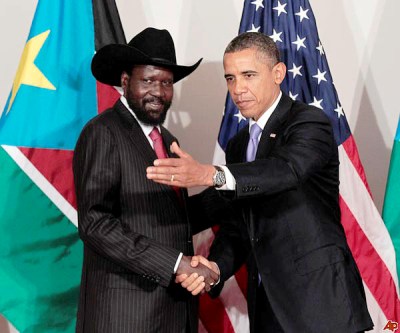S. Sudan says US sanctions could hasten peace process
April 17, 2014 (JUBA) – South Sudan on Thursday downplayed the significance of the sanctions which the United States government threatened to impose on individuals believed to be blocking the peace process between Juba and rebels that split from its ruling party and the army.

Minister Riak was briefing journalists on his recent trip to the US, where he reportedly held successful meetings with key officials from its governing administration, including the secretary of state and national security advisor.
Describing relations between Juba and Washington as “warm” and “strong”, the minister admitted that the latter expressed “grave concern” over the ongoing crisis, stressing that US officials assured him of their commitment to support the people of the new nation.
“The other thing I discussed with them is the targeted sanctions. There are no names which have been identified. The intention of the executive order was to hasten and encourage commitment to engage in current talks in Addis Ababa, Ethiopia, with full commitment and desire to end the conflict,” Riak explained.
“As the government we have already shown commitment and willingness to negotiate in faith with the other side. The president is fully committed to bring peace to this country”, he added.
He clarified that the United States did not raise with him any matter relating to interim arrangements, which would exclude participation of President Kiir and his political rival, former vice president Riek Machar.
“There were no discussions about interim arrangements. We did not discuss that”, said Riak.
Another presidential aide who was part of the foreign trip claimed the United States expressed commitment to strengthen and intensify cooperation with the new nation, if the latter adopts strong institutional reforms, specifically in the areas of rule of law and good governance.
“We had frank discussions with the American officials and they told us clearly that the United States is ready to support the promotion, protection and observance of human rights and the rule of rule, democratic transition, inclusive political processes, economic modernization and social inclusion,” said the official.
“They also expressed readiness to build our capacity of our officials in areas of financial management to enhance transparency and accountability”, he added.
SOUR RELATIONS
Relations between Juba and Washington began to shows signs of strain in 2011 immediately after South Sudan seceded from Sudan following its self-determination referendum necessitated by 2005 peace deal, which ended its over two decade conflict with Khartoum.
But observers attribute the growing uneasiness in relations between the two countries, to claims that President Kiir, during one of his official visits to Washington after the country’s independence misled his US counterpart about Juba’s alleged support to Sudanese rebels fighting in South Kordofan and Blue Nile states.
At a meeting with President Barack Obama, the South Sudanese leader reportedly denied that his country was maintaining any links with the SPLM-North rebels, which were until South Sudan’s secession part of Juba’s ruling party and its army.
Some observers have, however, attributed the strained relations between Juba and Washington to the emerging undemocratic tendencies, which critics say has stalled internal reform within the country’s ruling party.
(ST)
